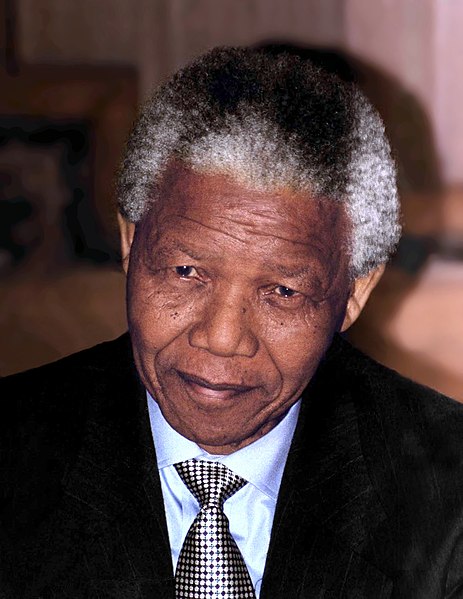Nelson Mandela: Timeless Leadership Lessons from a Global Icon

Embarking on a Journey through Mandela’s Leadership
Nelson Mandela, an emblem of hope and a paragon of leadership, not only transformed South Africa but also left an indelible mark on the world. As the first black president of South Africa and a prominent anti-apartheid revolutionary, Mandela’s life and leadership offer timeless lessons that continue to inspire and guide individuals from all walks of life. This article delves into the incredible journey of Mandela’s life, exploring his leadership qualities, which made him one of the most influential figures in modern history.
Brief background of Nelson Mandela
Nelson Mandela was born on July 18, 1918, in the small village of Qunu, South Africa. Originally named Rolihlahla, which means “troublemaker” in Xhosa, Mandela’s life was marked by his relentless pursuit of justice and equality for the oppressed people of his country. As a young man, Mandela became involved in the African National Congress (ANC), ultimately rising through the ranks and dedicating his life to the fight against the apartheid regime that brutally subjugated the black majority in South Africa. His dogged determination and unwavering commitment to his cause eventually led to his incarceration for 27 years. However, the world watched in awe as Mandela emerged from prison with a heart full of forgiveness, a spirit of reconciliation, and an unwavering belief in the power of unity.
Mandela’s impact on leadership
Mandela’s impact on leadership is multifaceted and profound, transcending geographical boundaries and cultural divides. Throughout his life, he demonstrated the importance of resilience, adaptability, forgiveness, and visionary thinking – qualities that continue to inform and inspire leaders today. Through his transformational leadership, Mandela not only united a deeply divided nation but also became a symbol of hope and reconciliation for the world. His legacy, which resonates across generations, serves as a testament to the power of leadership to shape history and inspire positive change. In this article, we will explore the various dimensions of Mandela’s leadership, drawing from his life experiences, lessons, and stories to illustrate the timeless relevance of his approach to leading others.
By examining the various facets of Mandela’s leadership, this article aims to provide insights into the characteristics and qualities that defined his approach, as well as the impact of his leadership on South Africa and the world. In doing so, we hope to offer readers a greater understanding of the importance of effective leadership and inspire them to embody Mandela’s values and principles in their own lives. Whether you are a seasoned leader or an aspiring one, Mandela’s life and leadership offer valuable lessons that can guide and inform your own journey towards becoming a more effective and influential leader.
Early Life and Struggles
Nelson Mandela’s early life and struggles laid the foundation for the extraordinary leader he would become. Through his upbringing, education, and political activism, Mandela cultivated a deep sense of justice and an unwavering commitment to the fight for equality. This section delves into the formative experiences that shaped Mandela’s character and leadership, highlighting the key moments that forged his path and set the stage for his historic achievements.
Mandela’s upbringing and education
Born into the Thembu royal family, Nelson Mandela was raised in the rural village of Qunu, South Africa. He was the first member of his family to receive a formal education, attending the University of Fort Hare and later the University of Witwatersrand, where he studied law. His education exposed him to diverse ideas and beliefs, which broadened his perspective and fueled his passion for justice and equality.
Mandela’s upbringing instilled in him a deep respect for tradition and a strong sense of responsibility. As a result, he developed a profound understanding of the importance of community and the power of collective action. His early life experiences also engendered in him a deep empathy for the marginalized and the oppressed, which would later become a defining characteristic of his leadership.
Mandela’s involvement in the African National Congress (ANC)
In 1944, Mandela joined the African National Congress (ANC), a political party dedicated to dismantling the apartheid system and achieving full political rights for all South Africans. Mandela quickly emerged as a prominent leader within the ANC, co-founding the Youth League and leading numerous protests and acts of civil disobedience against the apartheid regime. His activism earned him the admiration of many South Africans who saw in him a champion of their cause and a fearless advocate for change.
Mandela’s involvement in the ANC not only honed his leadership skills but also fostered his deep commitment to the ideals of democracy, freedom, and justice. His early political experiences allowed him to witness firsthand the power of grassroots organizing and the potential for change that comes from a united and mobilized populace. These insights would later guide Mandela’s approach to leadership and his unwavering belief in the power of collective action.
Imprisonment and personal growth
In 1962, Mandela was arrested and charged with sabotage and conspiracy to overthrow the government. He was subsequently sentenced to life in prison, spending 27 years behind bars, the majority of which were spent in the notorious Robben Island prison. Despite the harsh conditions and constant threat of punishment, Mandela used his time in prison to reflect, grow, and prepare for his future role as a national leader.
During his incarceration, Mandela continued to educate himself and his fellow inmates, creating what came to be known as the “University of Robben Island.” He also maintained a disciplined routine that included regular exercise, reading, and reflection, which helped him to develop the inner strength and resilience that would later define his leadership.
Mandela’s imprisonment also provided him with the opportunity to refine his political philosophy and develop a nuanced understanding of his adversaries. Through his interactions with his captors and fellow inmates, Mandela cultivated the art of negotiation and honed his ability to communicate across divides. This skill would later prove instrumental in his efforts to unite South Africa and bring about a peaceful transition to democracy.
Nelson Mandela’s early life and struggles played a crucial role in shaping his character and leadership. His upbringing and education imbued him with a strong sense of justice and a deep empathy for the marginalized, while his involvement in the ANC and his imprisonment honed his political acumen and forged his resilience. These formative experiences not only prepared Mandela for the challenges that lay ahead but also laid the groundwork for the transformative leader he would become.
Leadership Through Forgiveness and Reconciliation
Nelson Mandela’s leadership was marked by an extraordinary capacity for forgiveness and a deep commitment to reconciliation. His ability to embrace his former adversaries and foster unity in a deeply divided nation stands as a testament to the power of compassion, empathy, and understanding in leadership. In this section, we explore the significance of forgiveness and reconciliation in Mandela’s leadership, as well as the profound impact of these qualities on his efforts to heal and unite South Africa.
The importance of forgiveness in Mandela’s leadership
One of the most remarkable aspects of Mandela’s leadership was his unwavering commitment to forgiveness, even in the face of unimaginable personal suffering and injustice. His ability to forgive his oppressors and embrace his former adversaries demonstrated not only his extraordinary capacity for empathy but also his deep understanding of the power of forgiveness to heal and transform.
Mandela’s commitment to forgiveness allowed him to transcend the pain and bitterness of his past, enabling him to focus on the future and the potential for positive change. This focus on forgiveness and reconciliation was crucial in fostering an atmosphere of trust and cooperation between South Africa’s diverse communities, paving the way for the peaceful transition to democracy and the establishment of a more just and equitable society.
The establishment of the Truth and Reconciliation Commission
A key manifestation of Mandela’s commitment to forgiveness and reconciliation was the establishment of the Truth and Reconciliation Commission (TRC) in 1995. The TRC, which was tasked with investigating human rights abuses committed during the apartheid era, was a groundbreaking initiative that sought to promote healing and unity through a process of truth-telling and forgiveness.
Under Mandela’s leadership, the TRC provided a platform for victims and perpetrators alike to share their stories and confront the painful legacy of apartheid. This process allowed South Africans from all walks of life to come together in a spirit of forgiveness and understanding, ultimately fostering a sense of national unity and paving the way for a more inclusive and equitable future.
Mandela’s role in uniting a divided nation
Mandela’s unwavering commitment to forgiveness and reconciliation played a critical role in uniting a deeply divided South Africa. Through his actions and words, Mandela demonstrated that it was possible to overcome even the most entrenched divisions and build a more just and equitable society based on mutual respect and understanding.
By embracing his former adversaries and working tirelessly to promote reconciliation, Mandela was able to foster a sense of national unity and shared purpose that transcended racial, ethnic, and cultural divides. His leadership through forgiveness and reconciliation not only helped to heal the wounds of apartheid but also laid the foundation for the peaceful transition to democracy and the establishment of a more inclusive and equitable South Africa.
Nelson Mandela’s leadership through forgiveness and reconciliation stands as a powerful example of the transformative power of compassion, empathy, and understanding in leadership. His ability to transcend the pain and bitterness of his past and embrace his former adversaries demonstrated not only his extraordinary capacity for forgiveness but also his deep commitment to the ideals of justice, equality, and unity. By promoting forgiveness and reconciliation, Mandela was able to unite a deeply divided nation and lay the groundwork for a more just and equitable future, leaving behind a lasting legacy that continues to inspire and guide leaders around the world.
Visionary Leadership and the Pursuit of Freedom
Nelson Mandela’s leadership was characterized by a visionary approach that guided his pursuit of freedom, justice, and equality. His unwavering commitment to a more just and equitable South Africa inspired millions and galvanized a nation to overcome seemingly insurmountable challenges. In this section, we explore the significance of Mandela’s vision for South Africa, the role of visionary leadership in inspiring change, and the enduring impact of Mandela’s pursuit of freedom on his country and the world.
The significance of Mandela’s vision for South Africa
At the core of Mandela’s leadership was a clear and compelling vision for a more just and equitable South Africa, free from the shackles of apartheid and rooted in the principles of democracy, equality, and justice. This vision, which was informed by Mandela’s deep commitment to human rights and social justice, served as a guiding light throughout his life, shaping his actions and decisions and inspiring countless others to join him in the struggle for freedom.
Mandela’s vision for South Africa was not only a powerful call to action but also a source of hope and inspiration for millions of South Africans who had suffered under the oppressive apartheid regime. By articulating a bold and compelling vision for the future, Mandela was able to inspire a nation to believe in the possibility of change and the power of collective action to overcome even the most entrenched systems of oppression.
The role of visionary leadership in inspiring change
Mandela’s visionary leadership played a crucial role in inspiring and mobilizing South Africans to join the struggle for freedom and democracy. By articulating a clear and compelling vision for a more just and equitable society, Mandela was able to unite diverse communities and galvanize a nation to rise up against the oppressive apartheid regime.
Visionary leaders like Mandela recognize the power of a shared vision to inspire change and foster a sense of shared purpose among diverse stakeholders. By communicating a clear and compelling vision for the future, visionary leaders can inspire individuals to overcome their fears, embrace new possibilities, and work together to achieve transformative change.
Mandela’s unwavering commitment to equality and justice
Throughout his life, Mandela remained steadfast in his pursuit of freedom, justice, and equality for all South Africans, regardless of race, ethnicity, or socioeconomic background. His unwavering commitment to these ideals not only inspired millions to join him in the struggle for freedom but also shaped the course of South Africa’s transition to democracy and the establishment of a more just and equitable society.
Mandela’s tireless pursuit of freedom, justice, and equality serves as a powerful reminder of the importance of staying true to one’s vision and principles, even in the face of seemingly insurmountable challenges. By remaining steadfast in his pursuit of a more just and equitable South Africa, Mandela demonstrated the power of visionary leadership to inspire change, overcome adversity, and transform the world.
Nelson Mandela’s visionary leadership and unwavering commitment to the pursuit of freedom, justice, and equality stand as powerful examples of the transformative power of a clear and compelling vision. By articulating a bold and inspiring vision for South Africa’s future, Mandela was able to unite diverse communities, galvanize a nation, and ultimately bring about transformative change that continues to shape his country and inspire the world. His visionary leadership serves as a powerful reminder of the importance of staying true to one’s principles and the power of collective action to overcome even the most entrenched systems of oppression.
Leading by Example and Demonstrating Integrity
Nelson Mandela’s leadership was marked by an unwavering commitment to integrity and a steadfast dedication to leading by example. His authenticity, moral compass, and personal sacrifices not only earned him the trust and respect of millions but also served as a powerful testament to the transformative power of principled leadership. In this section, we explore the importance of authenticity in Mandela’s leadership, the influence of his values, and the impact of his personal sacrifices on his leadership and legacy.
The importance of authenticity in Mandela’s leadership
Mandela’s leadership was characterized by a deep sense of authenticity that resonated with people from all walks of life. He was genuine, humble, and true to himself, qualities that endeared him to millions and earned him the trust and respect of both friends and foes alike.
Authenticity in leadership is crucial in building trust, credibility, and long-lasting relationships. Mandela’s authenticity allowed him to connect with people on a personal level, bridging divides and fostering a sense of unity and shared purpose. His genuine demeanor and unwavering commitment to his principles served as powerful reminders of the importance of staying true to oneself and leading with integrity, even in the face of adversity.
Mandela’s moral compass and the influence of his values
Mandela’s leadership was guided by a strong moral compass rooted in his deeply held values of justice, equality, and human dignity. These values informed his decisions and actions throughout his life, shaping his approach to leadership and his pursuit of a more just and equitable South Africa.
Mandela’s unwavering commitment to his values not only inspired millions to join him in the struggle for freedom but also served as a powerful testament to the transformative power of principled leadership. By consistently adhering to his values, even in the face of immense personal and political challenges, Mandela demonstrated the importance of integrity and moral courage in leadership.
The impact of Mandela’s personal sacrifices on his leadership
Mandela’s leadership was marked by a willingness to make immense personal sacrifices for the greater good. His 27 years of imprisonment, the hardships he endured, and the personal losses he suffered stand as powerful examples of the lengths to which Mandela was willing to go in pursuit of his vision for a more just and equitable South Africa.
Mandela’s personal sacrifices not only underscored the depth of his commitment to his cause but also served as a powerful testament to his resilience, courage, and determination. These sacrifices, along with his unwavering dedication to his principles, earned him the admiration and respect of millions, inspiring countless others to join him in the struggle for freedom and justice.
Nelson Mandela’s leadership was characterized by a deep commitment to integrity, authenticity, and leading by example. His unwavering dedication to his values, the sacrifices he made, and the authenticity with which he led not only earned him the trust and respect of millions but also served as powerful reminders of the transformative power of principled leadership. Mandela’s example continues to inspire and guide leaders around the world, reminding us of the importance of staying true to our values and leading with courage, integrity, and resilience.
Embracing Change and Adaptability
Nelson Mandela’s leadership was marked by an exceptional ability to embrace change and adapt to evolving circumstances. His capacity to remain agile and flexible in the face of adversity, as well as his ability to anticipate and navigate complex challenges, set him apart as a leader and contributed significantly to his success. In this section, we explore Mandela’s adaptability, the significance of embracing change for leaders, and examples of his adaptability throughout his life.
Mandela’s ability to adapt to changing circumstances
Mandela’s ability to adapt to changing circumstances was a defining characteristic of his leadership. Whether he was confronting the shifting dynamics of the struggle against apartheid, navigating the complexities of his long imprisonment, or steering South Africa through its transition to democracy, Mandela consistently demonstrated an uncanny ability to adapt, learn, and grow in response to new challenges and opportunities.
This adaptability allowed Mandela to remain resilient in the face of adversity and to effectively navigate the complex and often tumultuous landscape of South African politics. By embracing change and remaining open to new ideas and approaches, Mandela was able to stay ahead of the curve and effectively guide his country through a period of profound transformation.
The significance of embracing change for leaders
The ability to embrace change and adapt to evolving circumstances is a crucial skill for leaders in today’s rapidly changing world. As the pace of change accelerates and the challenges facing leaders become increasingly complex, the capacity to remain agile, flexible, and open to new ideas and approaches is more important than ever.
For leaders like Mandela, embracing change is not just a matter of survival but also a key driver of success and growth. By remaining adaptable and open to new ideas, leaders can more effectively navigate the challenges and opportunities that come their way, fostering a culture of innovation, resilience, and continuous improvement within their organizations.
Examples of Mandela’s adaptability throughout his life
Throughout his life, Mandela demonstrated an exceptional capacity for adaptability, embracing change and evolving his approach as circumstances demanded. Some notable examples of his adaptability include:
-
Shifting from nonviolence to armed resistance: In the early years of his political activism, Mandela was a staunch advocate of nonviolent resistance. However, as the apartheid regime’s repression intensified, he recognized the need to adopt new tactics and co-founded the ANC’s armed wing, Umkhonto we Sizwe, in response.
-
Nurturing relationships with his captors: During his long imprisonment, Mandela adapted to his circumstances by cultivating relationships with his jailers and prison authorities. This strategy not only helped to improve his conditions but also laid the groundwork for the negotiations that would eventually lead to his release and South Africa’s transition to democracy.
-
Negotiating a peaceful transition to democracy: As South Africa’s first black president, Mandela faced the monumental task of steering the country through its transition to democracy. Recognizing the potential for violence and unrest, he adapted his approach by prioritizing reconciliation and unity, working tirelessly to foster a sense of national identity and shared purpose among South Africa’s diverse communities.
Nelson Mandela’s ability to embrace change and adapt to evolving circumstances was a defining characteristic of his leadership and a key factor in his success. His adaptability enabled him to effectively navigate the complex landscape of South African politics and played a crucial role in shaping the country’s transition to democracy. As leaders around the world grapple with the challenges and opportunities of a rapidly changing world, Mandela’s example serves as a powerful reminder of the importance of remaining agile, flexible, and open to new ideas and approaches.
The Power of Resilience and Perseverance
Nelson Mandela’s leadership was characterized by an extraordinary sense of resilience and perseverance. His ability to endure immense hardships, maintain hope in the face of adversity, and remain steadfast in his pursuit of justice and equality inspired millions and played a critical role in his success as a leader. In this section, we explore Mandela’s resilience during his 27-year imprisonment, the importance of perseverance in achieving long-term goals, and his demonstration of resilience in the face of adversity.
Mandela’s resilience during his 27-year imprisonment
Mandela’s 27-year imprisonment on Robben Island and later at Pollsmoor and Victor Verster Prisons stands as a powerful testament to his resilience and determination. Despite the harsh conditions, isolation, and seemingly insurmountable challenges, Mandela remained steadfast in his commitment to his ideals and his pursuit of justice and equality.
Throughout his imprisonment, Mandela used his time to study, reflect, and engage with his captors in a manner that ultimately helped him build bridges and lay the groundwork for future negotiations. His ability to maintain hope, cultivate inner strength, and remain focused on his ultimate goals, despite the immense challenges he faced, speaks to the power of resilience and perseverance in the face of adversity.
The importance of perseverance in achieving long-term goals
Perseverance is a critical component of effective leadership, particularly when it comes to achieving long-term goals and driving transformative change. As Mandela’s life and leadership demonstrate, the ability to remain steadfast in one’s pursuit of a vision, even in the face of adversity, is essential for overcoming obstacles and achieving lasting impact.
Mandela’s perseverance not only enabled him to endure 27 years of imprisonment but also fueled his lifelong struggle for justice and equality. By remaining steadfast in his pursuit of a more just and equitable South Africa, Mandela was able to inspire millions, mobilize a nation, and ultimately bring about transformative change that continues to shape his country and the world.
Mandela’s demonstration of resilience in the face of adversity
Throughout his life, Mandela faced numerous challenges and setbacks, yet his resilience in the face of adversity never wavered. Some notable examples of his resilience include:
-
Overcoming the loss of his family: Mandela suffered numerous personal losses during his imprisonment, including the death of his mother and eldest son. Despite these devastating losses, Mandela continued to draw strength from his commitment to his cause, using his grief as a source of motivation and resilience.
-
Navigating post-apartheid challenges: As South Africa’s first black president, Mandela faced immense challenges in leading the country through its transition to democracy. He demonstrated remarkable resilience in the face of these challenges, working tirelessly to foster unity, promote reconciliation, and build a more just and equitable society.
-
Maintaining hope and optimism: Mandela’s resilience extended beyond his ability to endure physical hardships and personal loss. His unwavering sense of hope and optimism, even in the face of seemingly insurmountable odds, served as a source of strength and inspiration for millions, demonstrating the power of resilience in sustaining one’s spirit and determination.
Nelson Mandela’s extraordinary resilience and perseverance played a critical role in his success as a leader and his ability to bring about transformative change. His enduring hope, unwavering commitment to justice and equality, and ability to persevere in the face of immense challenges and adversity serve as powerful reminders of the importance of resilience and perseverance in leadership. By emulating Mandela’s resilience and determination, leaders can inspire others, overcome obstacles, and achieve lasting impact in the pursuit of their goals and visions.
Empowering Others and Fostering Collaboration
Nelson Mandela’s leadership was marked by a strong commitment to empowering others and fostering collaboration. He recognized that the struggle for freedom, justice, and equality could not be achieved by a single individual, but rather required the collective efforts of diverse communities working together in pursuit of a shared vision. In this section, we explore Mandela’s commitment to empowering others, the role of collaboration in his leadership style, and examples of his efforts to foster teamwork and unity.
Mandela’s commitment to empowering others
At the heart of Mandela’s leadership was a deep belief in the power of individuals to make a difference and contribute to the greater good. Throughout his life, Mandela consistently sought to empower others, providing them with the tools, resources, and opportunities they needed to grow and succeed.
Mandela’s commitment to empowering others extended beyond the political realm to encompass education, health, and economic development. He understood that by equipping individuals with the knowledge, skills, and resources they needed to thrive, he could help create a more just and equitable society in which all South Africans could flourish.
The role of collaboration in Mandela’s leadership style
Collaboration was a key component of Mandela’s leadership style, reflecting his belief that the most significant accomplishments could only be achieved through the collective efforts of diverse communities working together. By fostering a culture of collaboration, Mandela was able to unite disparate factions, bridge divides, and create a sense of shared purpose among South Africans from all walks of life.
Mandela’s collaborative leadership style was characterized by an ability to listen, learn, and engage with others, as well as a willingness to build consensus and seek common ground. By prioritizing dialogue, cooperation, and mutual understanding, Mandela was able to forge strong alliances, build broad-based support, and effectively navigate the complex political landscape of South Africa’s transition to democracy.
Examples of Mandela fostering teamwork and unity
Throughout his life, Mandela demonstrated a remarkable ability to foster teamwork and unity, both within his own organization and across broader society. Some notable examples of his efforts to promote collaboration and unity include:
-
Building alliances within the anti-apartheid movement: During the struggle against apartheid, Mandela worked tirelessly to forge alliances among diverse political factions, recognizing that a united front was essential for success. This collaborative approach helped the anti-apartheid movement gain momentum and ultimately led to the downfall of the apartheid regime.
-
Negotiating a peaceful transition to democracy: As South Africa embarked on its transition to democracy, Mandela prioritized dialogue, cooperation, and reconciliation, working closely with former adversaries to build consensus and chart a path forward for the nation. His efforts to promote collaboration and unity during this critical period played a key role in ensuring a peaceful and stable transition.
-
Establishing the Truth and Reconciliation Commission (TRC): In the aftermath of apartheid, Mandela recognized the need for a process of healing and reconciliation to unite a deeply divided nation. By establishing the TRC, Mandela provided a forum for South Africans to confront their past, foster understanding, and work together to build a more just and equitable future.
Nelson Mandela’s leadership was marked by a strong commitment to empowering others and fostering collaboration. By prioritizing teamwork, unity, and collective action, Mandela was able to unite diverse communities, overcome seemingly insurmountable challenges, and bring about transformative change in South Africa. His collaborative approach to leadership serves as a powerful reminder of the importance of working together in pursuit of a shared vision and the potential of collective action to achieve lasting impact.
The Legacy of Nelson Mandela
Nelson Mandela’s life and leadership continue to have a profound impact on South Africa and the world, inspiring millions with his unwavering commitment to justice, equality, and freedom. His legacy endures not only through the transformative changes he brought about but also through the enduring lessons of his leadership, which remain as relevant today as ever. In this section, we explore the lasting impact of Mandela’s leadership, the continued relevance of his leadership lessons, and how his story continues to inspire future generations.
The lasting impact of Mandela’s leadership on South Africa and the world
The impact of Mandela’s leadership on South Africa is nothing short of extraordinary. As the first black president of a democratic South Africa, Mandela played a pivotal role in dismantling the apartheid system and fostering a peaceful transition to a more just and equitable society. His commitment to reconciliation, unity, and social justice laid the foundation for a new South Africa and set the stage for the ongoing process of healing and transformation.
Beyond South Africa, Mandela’s leadership has had a profound impact on the global stage. As a tireless advocate for human rights, democracy, and social justice, Mandela inspired countless individuals and movements around the world, helping to shape the course of history and advance the cause of freedom and equality. His life and leadership continue to serve as a beacon of hope and a powerful reminder of the potential of individuals to make a difference in the world.
The continued relevance of Mandela’s leadership lessons
The lessons of Mandela’s leadership remain as relevant today as ever, offering timeless insights and guidance for leaders across a wide range of contexts and disciplines. Some of the most enduring lessons of his leadership include the importance of:
-
Vision and determination: Mandela’s unwavering commitment to his vision for a more just and equitable society demonstrates the power of clear goals and determination in driving transformative change.
-
Empathy and humility: Mandela’s ability to connect with others, understand their perspectives, and show genuine compassion and humility in his interactions underscores the critical role of empathy and humility in effective leadership.
-
Adaptability and resilience: Mandela’s capacity to embrace change, adapt to evolving circumstances, and persevere in the face of adversity offers a powerful example of the importance of adaptability and resilience in leadership.
-
Empowering others and fostering collaboration: Mandela’s commitment to empowering others and promoting teamwork and unity highlights the significance of collaborative leadership in achieving shared goals and creating lasting impact.
Inspiring future generations through Mandela’s story
Mandela’s life and leadership continue to inspire future generations, offering a compelling example of the power of individuals to make a difference in the world. His story serves as a testament to the human spirit’s ability to overcome adversity, pursue justice, and achieve lasting impact, providing a source of inspiration and hope for those who seek to follow in his footsteps.
By sharing Mandela’s story and the lessons of his leadership, we can help equip future generations with the tools, insights, and inspiration they need to tackle the challenges of their own times and continue the work of building a more just, equitable, and inclusive world. As we strive to honor Mandela’s legacy, we must remember his enduring message of hope, perseverance, and the transformative power of collective action in the pursuit of a better future.
The legacy of Nelson Mandela continues to have a profound impact on South Africa and the world, offering timeless lessons in leadership and inspiring future generations to carry on his work. By reflecting on his life, embracing the lessons of his leadership, and sharing his story with others, we can help ensure that Mandela’s vision of justice, equality, and freedom endures for generations to come.
Nelson Mandela’s Enduring Leadership Lessons
Throughout this exploration of Nelson Mandela’s leadership, we have delved into the various aspects that made him an extraordinary figure in modern history. His unwavering commitment to justice, equality, and freedom, as well as his ability to inspire and empower others, has left an indelible mark on South Africa and the world at large. As we reflect on his life and legacy, we gain invaluable insights into the qualities and principles that define truly transformative leadership.
Mandela’s visionary approach, coupled with his determination to achieve his goals, demonstrates the power of a clear and compelling vision. His empathetic nature, humility, and capacity for forgiveness reveal the significance of leading with compassion and understanding. Furthermore, his adaptability, resilience, and perseverance in the face of adversity underscore the importance of remaining steadfast in one’s convictions, even when faced with seemingly insurmountable obstacles.
By fostering collaboration and unity, Mandela harnessed the collective power of diverse communities to bring about lasting change. His commitment to empowering others and his ability to inspire future generations ensure that the impact of his leadership will continue to reverberate for years to come.
In a world that continues to grapple with pressing challenges and complex social issues, the lessons of Mandela’s leadership remain more relevant than ever. His life and legacy offer a roadmap for those seeking to drive transformative change, providing a blueprint for effective leadership grounded in empathy, humility, resilience, and collaboration.
As we conclude our exploration of Nelson Mandela’s leadership, we are reminded of the powerful impact that a single individual can have on the world. By embracing the lessons of his leadership, we can honor Mandela’s legacy and carry forward his message of hope, perseverance, and the transformative power of collective action. Ultimately, Mandela’s story serves as a testament to the human spirit’s capacity to rise above adversity and achieve greatness, inspiring all of us to strive for a better, more just, and inclusive future.





